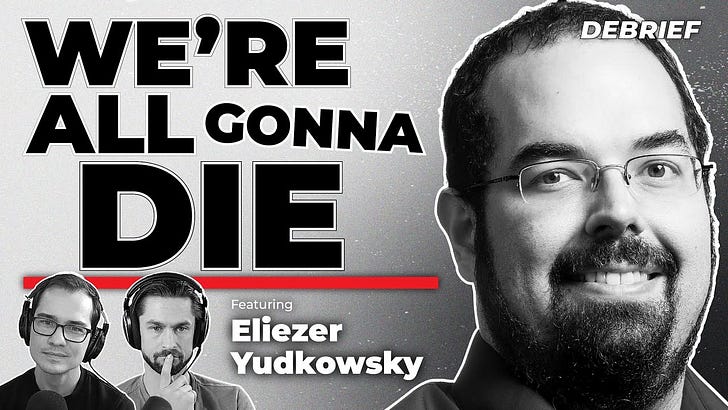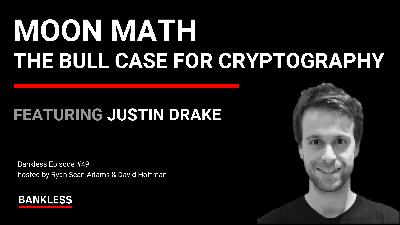🎙 Early Access: The Crypto Milkshake Theory | Brent Johnson
Description
You have early access to this episode and a copy of the transcript as a full Bankless Member.
Brent Johnson, known for his “Dollar Milkshake Theory,” is a macro-focused wealth manager. We discuss the markets from his broad perspective, focusing on the Federal Reserve, the Dollar, and our take on his ideas – The Crypto Milkshake Theory.
Listen in Podcast App | iTunes | Spotify | YouTube | RSS Feed
Tools from our sponsors to go bankless:
⭐️ AAVE | BORROW OR LEND YOUR ASSETShttps://bankless.cc/aave
🚀 GEMINI | MOST TRUSTED EXCHANGE AND ONRAMPhttps://bankless.cc/go-gemini
💳 MONOLITH | GET THE HOLY GRAIL OF BANKLESS VISA CARDS https://bankless.cc/monolith
📈 KWENTA | DERIVATIVES TRADING WITH INFINITE LIQUIDITYhttps://bankless.cc/kwenta
52 - The Crypto Milkshake Theory
Guest: Brent Johnson
We observed the Federal Reserve coming into the limelight in the past year, with increased attention on Jerome Powell and other central bankers as they become more like players than referees.
Brent lays out how our system (and all fiat currencies) are built for exponential growth. An exponentially growing market will be increasingly susceptible to larger and more frequent volatility. This calls for stronger central bank action, which accelerates these fundamental issues.
Interestingly, Brent believes in the strength of the Dollar (at least in the short-term), expecting it to be the last fiat currency to get knocked out. The COVID-19 Crash in March 2020 was an example of this deflationary volatility, and Brent views the system’s current narrative as ripe for another market crash and dollar bull run.
On the crypto side of things, Brent sees assets like BTC as a valid store of value, and the advantages of non-sovereign wealth stores merit serious consideration. His concerns about the space involve the difficulties of using crypto as money and the power of governments to curb blockchain use. However, blockchain technology is a “genie out of the bottle” and is here to stay.
Relevant Links:
Brent’s Presentation on The Dollar Milkshake Theory
Transcript
David Hoffman
All right, we are off to the races. Ryan, you want to take it away?
Ryan
Okay, Bankless Nation. We want to welcome Brent Johnson of Santiago Capital, who manages money for high net worth individuals who are looking to grow and preserve their wealth. Brent, welcome to the show. You are a macro thinker known for your Dollar Milkshake Theory, which we're going to talk about. And I love on Twitter that you are willing to push back against maybe Austrians, Bitcoin maximalists, and other dollar bears. Brent, it's awesome to have you on the show. Thanks for joining us.
Brent Johnson
And thanks for having me. Always, always happy to talk to new people. And I'm looking forward to it.
Ryan
This is gonna be a lot of fun. So I think you just came from the Jerome Powell meeting, you tuned in as a lot of folks do. What is Powell thinking these days? What are the updates for us?
Brent Johnson
Well, I think it's pretty interesting because he was very dovish, he really couldn't have been a lot more dovish, other than to say they were going to increase, you know, QE. But you know, the markets were having a tough day anyway. And they didn't exactly rally on his comments. So I kind of find it pretty interesting, because I think it kind of plays into a number of different themes that we see in the market right now. And some of these things, I don't necessarily agree with the fact that stocks only go up and that, you know, the Fed prints dollars and gives them to the banks and the banks go out and lever up and buy stocks, and therefore, you know, just short the dollar and buy equities, and everything will be fine. And I certainly understand that logic. And it's certainly been hard to argue with over the last eight months, but I think it's going to be a little bit more difficult than that over the next couple of years.
Ryan
Can we talk about that for a minute? Because it seems like everybody in finance tunes into what Jerome Powell says, and I don't know if it's always been like that. But it's certainly true that what central bankers say these days carries a whole lot of weight, maybe more weight than they ever have. Is that weird? Is Jerome Powell, God of finance, now this kind of new thing? And is it weird?
Brent Johnson
Well, I don't know that it's new. I agree that it's a little bit weird. I think it's very weird that, you know, normal everyday people who otherwise wouldn't even work in finance actually know who the Federal Reserve Chairman is. I think that's kind of odd. Because, you know, the whole central bankers as God has kind of become a meme unto itself. And they the central bankers around the world have, you know, to a certain extent become celebrities and rock stars. And I don't necessarily think that's healthy. But you know, it is what it is. And at the end of the day my job is to play the world as it is, not as I'd like it to be. And that fact right there is something that I think is very important, and that I think many people overlook, especially when it comes to investing. I think many people invest for the world they would like to see, rather than the world as it is. And I don't necessarily have a problem with that. If you're trying to change the world, and you're all in on your investments that you think are going to do that, then you know, I can respect that. But if your goal is just to make money, I don't necessarily think that's the right way to go about it.
David Hoffman
Right, this to me, the role of the central bank historically has been to be this like silent man behind the curtain, right, you know, maybe tinkering and playing with levers and dials, but otherwise being hidden from view. And the attitude is that, you know, a quiet or silent Fed is a good Fed, right? Like if they're not in the news cycle, they're doing their job. And that used to be the perception of the Federal Reserve. And I think that has been decaying over time and has a trajectory of going elsewhere from that perception. Maybe you could give us a brief history lesson as to like perhaps the trajectory of peoples' attitudes or perceptions of the Federal Reserve from what it was in times past to where it is now, to where you think it might be going in the future. How is society changing their thinking around what the Federal Reserve does?
Brent Johnson
That's a good question. It's kind of a very complicated one. I think you're for the most part right. I think it used to be that they were kind of the man behind the curtain. And, you know, I would argue that in the last 10 years, they are no longer the man behind the curtain. They're actually the magician on the stage. And they're actually putting on a performance. And, you know, there's a certain group of people who like the performance and are trying to profit from the performance. And there's another group of people who are saying, "you just think he's doing magic, but what he's actually doing is a trick and this trick is going to come back and haunt all of us." And so there's some friction between those two different camps. And I think the fact that, you know, central banks have now walked out on stage, and they've even said that this is the trick that we're going to do and they're trying to do it, I don't think that that's a long-term healthy thing. I think it's a bad thing, and the thing I'll say is, you know, I've said this before, I'm not a fan of central bankers at all. I, in fact, I'm very critical of central bankers. But based on the design of the monetary system, I understand why they're there. And again, if you're playing the world as it is, and you understand why, if you understand the design of the monetary system, then you understand why they're there, why they're necessary, and nothing that they do will surprise you because their job is to step in. Now, to your point, their job is to kind of be the man behind the curtain and kind of be silent. But the real role, their job is when there's a problem. And when there's a crisis, their job is to step in and being the lender of last resort to provide, you know, whatever means necessary to perpetuate the system. So while I don't agree with what central banks do, and I wish there was a system that didn't require them, the system as it is today does require them. And so I'm never surpri





















